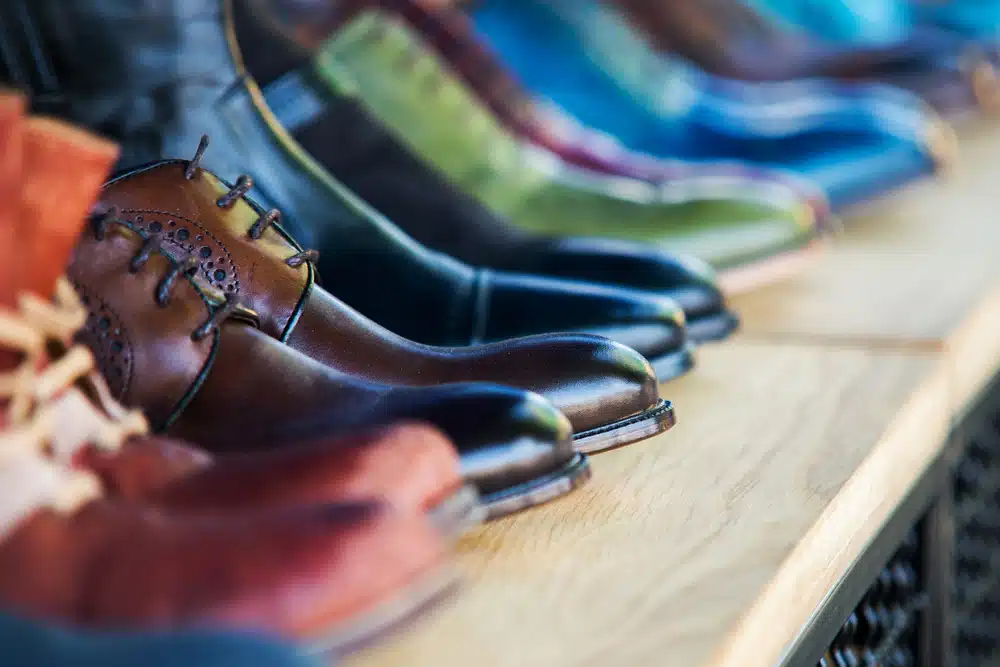
From the rise of sustainable and ethical footwear to the growing popularity of online shopping, shoe shops must adapt to these trends in order to remain competitive and meet the needs of their customers.
In this context, understanding the latest trends and innovations in the shoe shop sector is essential for businesses looking to stay ahead of the curve and succeed in today’s market
Here are the latest trends within the shoe retail industry 2024.
What has been happening in the shoe retailing sector
There are a number of large multi-chain shoe stores that dominate the shoe retailing industry. There has been an increase in non-specialised retailers, such as clothing stores and major supermarkets, selling shoes in the last few years.
The independent shoe shops are increasingly being competed with by out-of-town superstores, mail-order companies, and internet retailers.
As shoppers cut back on their spending during the economic downturn of the late 2000s and early 2010, things got even worse. Additionally, consumers did not buy light footwear and sandals during the early 2010s due to the cool, wet summers.
It was a difficult year for the footwear sector in 2013, despite the economy starting to recover. Despite the economy’s continued improvement in 2014 and 2015, footwear retailers faced continued price pressure. In 2015, customers were put off buying winter shoes and boots by mild autumn and winter weather, which caused discounts to become widespread.
The annual increase in footwear retail volume in 2016 was the slowest for several years. As shoe shops declined at a rate second only to fashion retailers in 2017, 2017 was another tough year for UK retail.
There is no indication that the tough trading conditions will end in 2018. It is forecast that volume sales will remain subdued during the forecast period, while price increases will drive growth. Sales volume growth will not exceed 2% between now and 2022. There is a likelihood that shoe shops will face difficult times in the future because of:
- Unpredictable weather – Warm winters lead to fewer sales of winter boots
- Intense price competition – resulting in reluctant customers
- The growing level of online sales – especially among young consumers who prefer cheap prices, quick delivery, and fresh fashion
- An increase in inflation – stagnant wages and declining consumer confidence
- Spending on dining out and travel has shifted away from footwear
Imported goods cost more in 2017 due to the fall in the value of the pound following the Brexit vote. A prolonged period of uncertainty in Brexit negotiations has kept the value of the pound low and is expected to keep it low for some time to come.
As sports footwear has become more popular, formal work shoes have fallen in demand. Due to their acceptability in work and social situations, sports shoes are likely to continue to be popular even after the athleisure wear trend fades away. Consumers buy trainers for running, walking, cycling and sports in general due to their comfort and the trend towards health and fitness.
As a small business owner, you may need to think of ways to make your shop stand out from the crowd, such as offering exclusive Italian shoes and boots that do not appear on the High Street.
Selling online
It was thought that shoe shops would be largely protected from the growth of online sales because customers prefer to try before they buy. Despite this, online sales of footwear are becoming more popular and the growth in sales makes it likely that online sales of footwear will continue to grow. You can reach a much wider market if you sell shoes online if you specialise in a certain type.
The online shoe retail sector has been experiencing significant growth in recent years, and independent shoe retailers are no exception. With the rise of e-commerce and the increasing popularity of online shopping, customers are increasingly turning to online retailers for their footwear needs. One key trend in the sector is the importance of offering a seamless online shopping experience, including easy-to-use websites, multiple payment options, and fast and reliable shipping.
Another trend is the growing demand for sustainable and ethical footwear, with customers seeking out retailers who prioritize eco-friendly and socially responsible practices. Online sales of expensive, designer brands have remained strong despite the recent economic downturn, even though demand for cheaper ranges has fallen. It’s important to keep in mind that returning shoes online can be costly, with nearly a quarter of them being returned.
Finally, independent shoe retailers are also competing with larger online retailers, and as such, must focus on building strong relationships with their customers through personalised marketing and exceptional customer service in order to differentiate themselves and succeed in the online marketplace.
Sustainability
Sustainability has become a major concern within the UK shoe shop sector in recent years, as consumers become increasingly aware of the environmental impact of their purchasing decisions. One of the key trends in this area is the rise of eco-friendly and sustainable footwear, made from materials such as recycled plastics, organic cotton, and natural rubber. Many shoe retailers are responding to this trend by introducing sustainable lines and products, and by adopting eco-friendly practices throughout their supply chains.
In addition to sustainable products, shoe retailers are also taking steps to reduce their environmental footprint through initiatives such as carbon-neutral delivery, sustainable packaging, and responsible waste management. These efforts not only help to minimise the environmental impact of the industry, but can also serve as a powerful differentiator for retailers looking to stand out in a crowded marketplace. As such, sustainability has become an increasingly important aspect of the UK shoe shop sector, and is likely to continue to shape the industry in the years to come.
Keeping up to date with the shoe retailing sector
Keep up with fashion trends and developments in footwear. Fashion trends can change very quickly. Keep up with industry developments by joining a trade association.
Shoe retailers in the UK are represented by the Independent Footwear Retailers Association (IFRA). Contact the IFRA at PO Box 123, Banbury, Oxfordshire OX15 6WB.
British Footwear Association (BFA) is the trade association representing the footwear industry as a whole in the UK. The association is located at 3 Burystead Place, Wellingborough, Northants NN8 1AH. Its website provides information about the footwear industry.
The British Footwear Association (BFA) is a key resource for shoe retailers in the UK, providing valuable insights into industry trends and best practices. In addition to promoting the interests of the industry as a whole, the BFA offers guidance and support on a range of legal issues that may affect shoe retailers, such as product safety regulations and employment law.
Its website is a valuable source of information for retailers looking to stay informed and compliant with these regulations. As such, the BFA plays an important role in helping shoe retailers navigate the complex legal landscape of the industry and operate their businesses with confidence.
Staying up to date with developments is also possible by subscribing to a trade journal. You can view the latest digital edition of Footwear Today on their website, which is supported by the BFA and the IFRA. Including shoe shops, Drapers Weekly serves the entire fashion industry.
On the World Footwear website, you can learn about footwear industry developments around the world.
Trade shows
The information you obtain from a trade show will be invaluable. You will have the opportunity to meet manufacturers, suppliers, and importers and plan your future stock purchases. Various trade sectors are covered on Exhibitions UK’s website.
Retail shows can be an excellent opportunity for shoe retailers in the UK to showcase their products, network with industry professionals, and stay up-to-date on the latest trends and innovations in the sector.
There are several prominent retail shows for shoe retailers in the UK:
- Moda
- Pure London
- The Footwear & Accessories Show
These shows attract a wide range of exhibitors, from independent retailers to larger brands, and offer a platform to display the latest collections and designs. In addition to the exhibition floor, these shows also feature seminars and workshops that provide valuable insights into industry trends and best practices.
Attending retail shows can be an important investment for shoe retailers, as they provide an opportunity to connect with suppliers, meet new customers, and gain a competitive edge in a crowded marketplace.
Read more: Sustainable fashion trends
Conclusion
Shoe retailers must stay abreast of the latest trends in the sector in order to remain competitive and meet the needs of their customers. Some key trends that shoe retailers should be aware of include the growing demand for sustainable and ethical footwear, the importance of a seamless online shopping experience, and the need to differentiate themselves from larger competitors through personalized marketing and exceptional customer service.
Other trends to watch out for include the rise of athleisure and sneaker culture, the popularity of statement-making footwear, and the increasing importance of data-driven insights in the retail industry.
Additionally, shoe retailers must stay informed on evolving consumer preferences, such as the trend towards more casual and comfortable footwear in the wake of the COVID-19 pandemic. By staying up-to-date on the latest trends and innovations in the sector, shoe retailers can position themselves for success and growth in an ever-changing marketplace.
Lee Jones is a seasoned Business Finance Specialist with over two decades of invaluable experience in the financial sector. With a keen eye for market trends and a passion for helping businesses thrive, Lee has become a trusted advisor to countless organizations seeking to navigate the complexities of finance.


